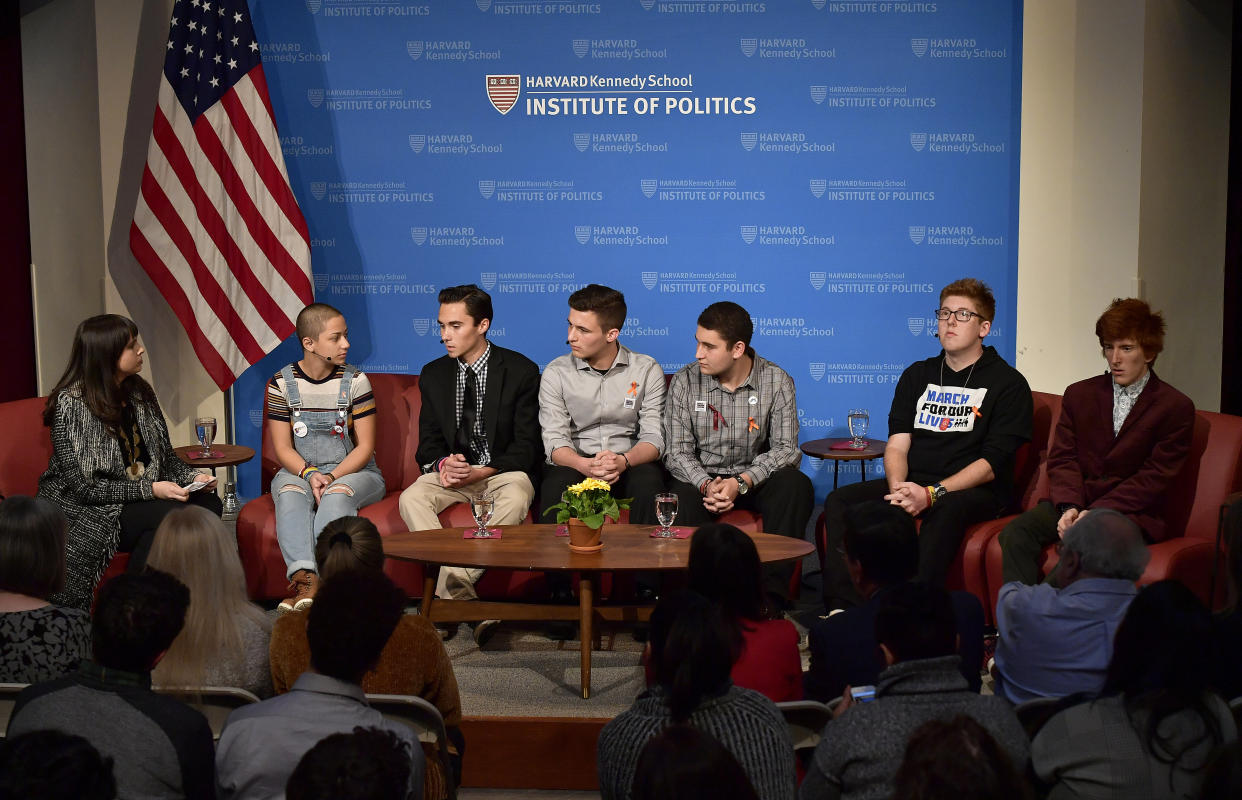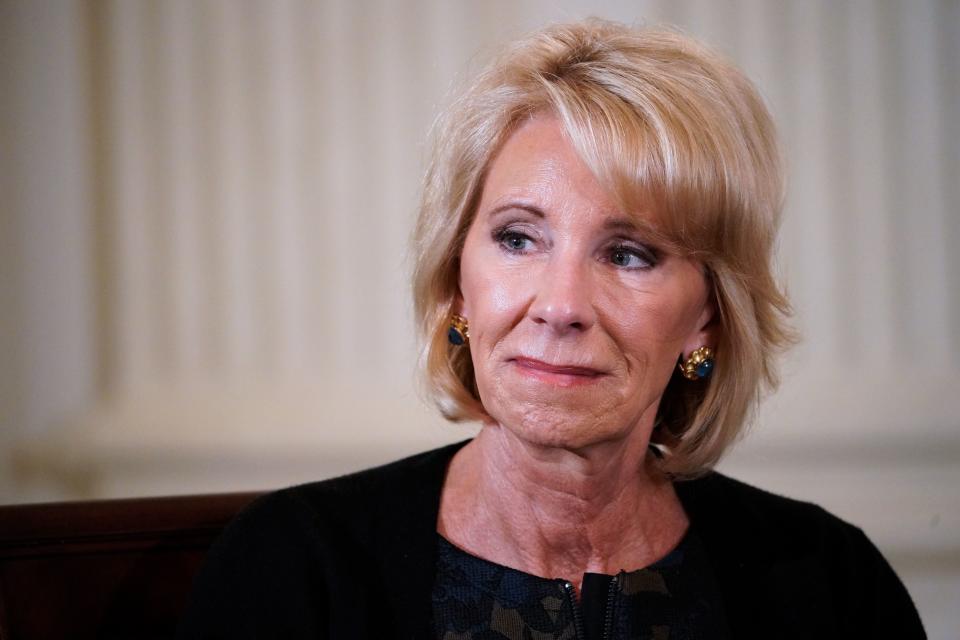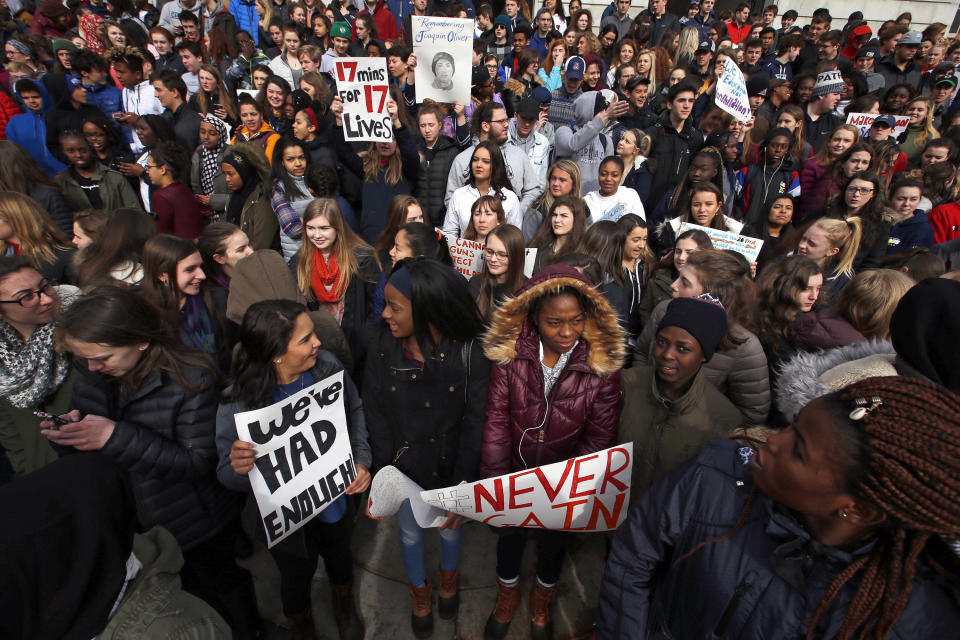Opinion: 'Hardening' Our Schools Will Hit Black And Brown Students Hardest

President Donald Trump has sought to limit, obstruct and even erase civil rights protections for many Americans: enacting state voter ID laws that discriminate against minorities, rolling back health care services for women and banning most transgender people from serving in the military. And now, he has turned his attention to targeting students.
The White House rolled out its proposal to “harden” schools last week, which came in response to the mass shooting at Marjory Stoneman Douglas High School in Parkland, Florida, in February.
As part of the plan, Education Secretary Betsy DeVos is set to lead a new commission to re-examine, and possibly repeal, the 2014 School Discipline Package from the Department of Justice and Department of Education. These federal guidelines came as districts across the country were being scrutinized for disproportionate discipline outcomes, particularly zero-tolerance policies that widened the opportunity gap for students of color. At the time, for example, African-American preschoolers were 3.6 times as likely as white preschoolers to be suspended at least once.
The School Discipline Package has provided key guidance to public elementary and secondary schools about how to discipline students without violating the Civil Rights Act of 1964 by discriminating on the basis of race, color or national origin. Its recommendations include drawing on positive behavior interventions, such as restorative justice and social and emotional learning ― programs that have been successful nationwide.
The Obama-era guidance reflects a growing body of research showing that overreliance on punitive discipline can hurt a school climate and harm educational opportunities.

Studies indicate that zero-tolerance practices funnel children into the school-to-prison pipeline, and especially threaten the civil rights of students of color and students with disabilities. Education Department data has shown, for example, that an African-American student with disabilities misses an estimated 113.3 days of instruction due to disciplinary removals, while a white student with disabilities misses an average of 39.5 days.
Beyond disrupting learning, exclusionary discipline can increase the likelihood that a child won’t graduate high school or will come into contact with the juvenile justice system — further widening the racial achievement and wealth gap in this country.
We must not allow the tragedy in Parkland to break down the existing safeguards and protections for future generations. If we are to follow the lead of Trump and DeVos, far too many students across the country will be placed at risk and diverted from a path of success.
This is not what the courageous Parkland youth — and the thousands of students who participated in the National School Walkout last week — are advocating for. Or why thousands of people are marching in Washington, D.C., and around the country on Saturday. They are calling for unity to end school violence. Students have the right to feel physically, emotionally and mentally safe at school. Too many kids are already exposed to the deeply traumatic effects of exclusionary discipline policies, which can further compound stress and exacerbate social, economic and health disparities.
Parkland has refocused our attention on safety in schools, but we owe it to our children to ensure that the rhetoric of safety does not jeopardize their civil rights.
It is deeply alarming that Devos’ new “school security” commission, which consists of four Cabinet members — none of whom are school security experts, teachers or school administrators — is making decisions that could leave a lasting and disruptive impact on the health and well-being of this country’s most valuable resource: children. We must follow the lead of those most experienced in education policy — including students, parents, teachers, administrators and academics — to create safer, healthier and more resilient learning environments.
Love HuffPost? Become a founding member of HuffPost Plus today.

Academic experts on school safety and school climate have already begun to work together to find a sustainable solution for how to protect children and adults from gun violence. They adopted a public health approach and developed a three-tiered action plan to ensure that all students have the opportunity to both survive and thrive. Nowhere in the plan does it suggest pulling away from federal guidelines. Instead, it calls for “[r]eform of school discipline to reduce exclusionary practices and foster positive social, behavioral, emotional, and academic success for students.”
Not surprisingly, the call to action has garnered overwhelming support from national and local organizations, as well as more than 4,000 individuals who represent school safety experts, teachers, principals and staff members.
Federal guidelines aimed at ensuring low-income and minority students, as well as those with disabilities, are not disciplined more harshly than their white and more affluent peers should not become the scapegoat in the newest debate on school violence. Not only is this proposal counterproductive to increasing school safety, it undermines the very purpose of public education: to provide all children with the social, academic, cultural and intellectual development skills necessary to lead healthy and productive lives.
Thalia González is a Senior Visiting Scholar at Georgetown Law Center. Alexis Etow is a Senior Attorney and Cesar De La Vega is a Legal Fellow at ChangeLab Solutions.
ALSO ON HUFFPOST OPINION
Any March For Our Lives Must Include Kids Like Trayvon Martin
Lawmakers, Ignore Gun Violence Survivors At Your Peril
Austin Bomber Is A Terrorist Of Our Own Making
This article originally appeared on HuffPost.

